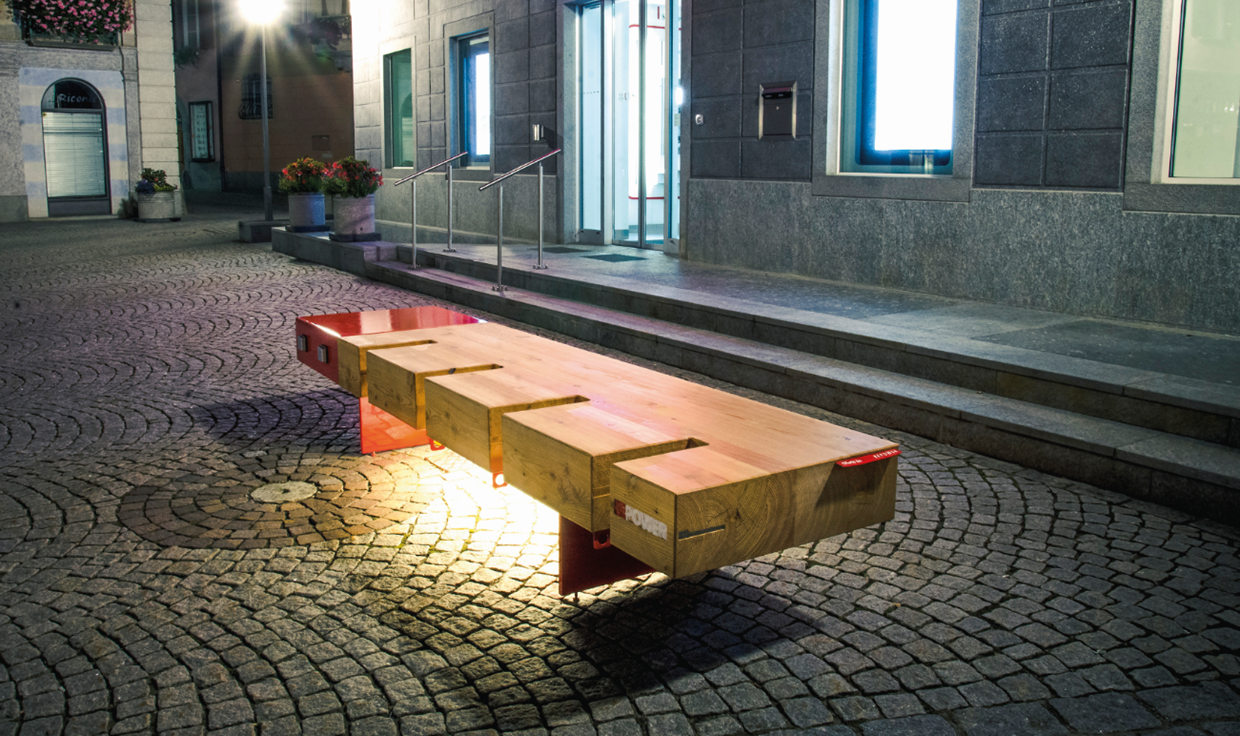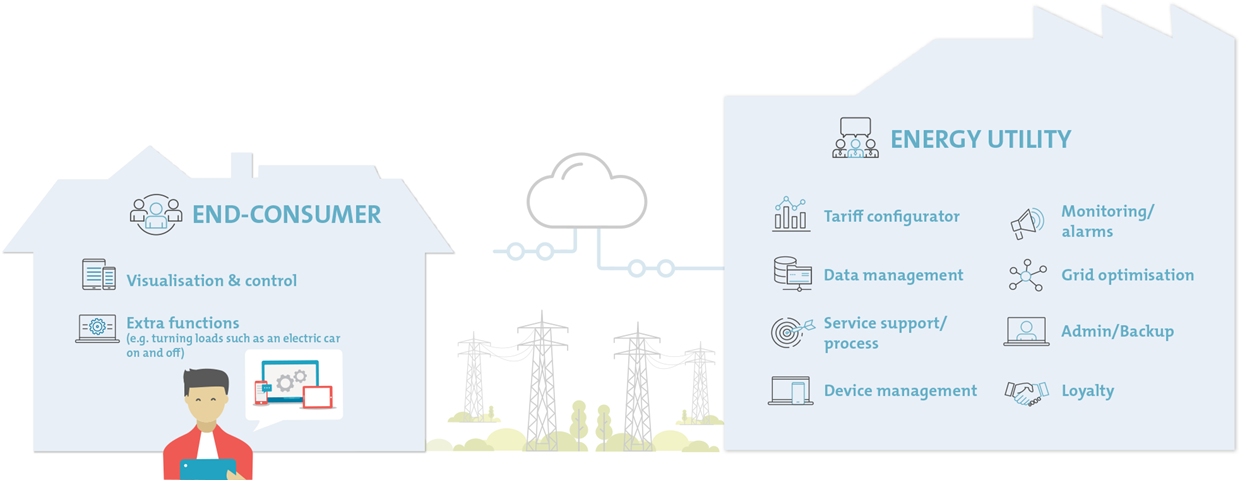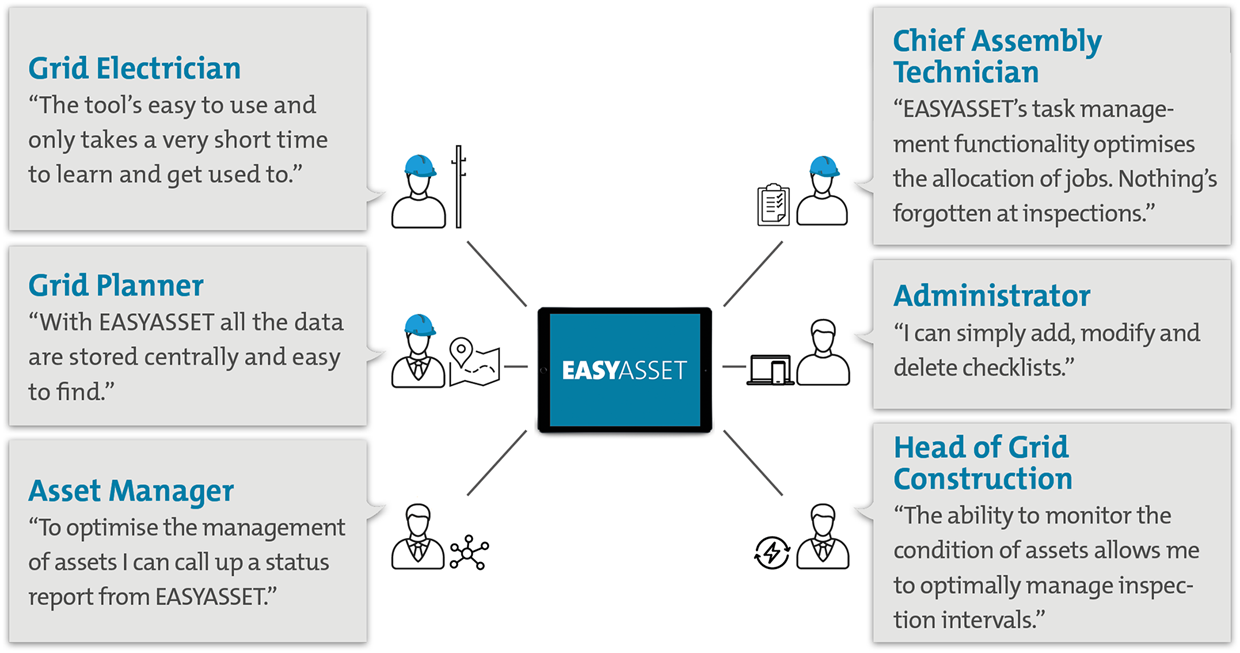
Market Switzerland segment
Overview
In 2017, the focus of Repower’s Sales was on boosting the sale of services. The offering in grid, trading and generation was expanded accordingly. Repower offers comprehensive services to energy utilities and infrastructure operators.
In 2017 it delivered 100 per cent renewable energy to end-consumers in its supply area. The product range encompasses Aquapower (Swiss hydropower), the green power mix Purepower, and Solarpower, pure solar energy from the region. Repower delivers these products to around 46,000 end-consumers ranging from private households and commercial customers to municipal utilities.
On both the Swiss and German markets Repower offers municipal electricity companies, large customers and other energy utilities structured energy supply, guarantees of origin and certified power products.
In 2017 Repower also launched a nationwide advertising campaign to raise awareness of its PLUG’N ROLL service for electric vehicles (EV). By the end of the year, around 100 charging points had been installed in Switzerland. The PLUG’N ROLL charging network now boasts more than 2,500 registered EV drivers, and the PLUG’N ROLL app has been downloaded more than 10,000 times.
Last year Repower decided to move ahead with charging services for two-wheeled vehicles as well with the launch of E-LOUNGE, a multipurpose station that combines a charging station for electric bikes with a bench for sitting on. E-LOUNGE is a blend of Italian design with Swiss technology and craftsmanship.
In 2017 Repower also managed to add three waste incineration plants to its portfolio of energy and flexibility marketing customers, harnessing a clientele whose electricity is in demand in the marketplace and that can also provide technical flexibility.
On the Grid side, Repower invested around CHF 22.7 million in assets in its own supply area. Expenditure on regular maintenance came to CHF 21.6 million. These investments help assure the security of supply and make a substantial contribution to the implementation of the federal government’s Energy Strategy 2050. In 2017 Repower constructed additional grids in the Landquart-Prättigau-Davos area. These constitute important extensions to the pan-regional high-voltage grid to assure grid capacity and security of supply. Worthy of mention from an environmental point of view is the fact that these lines run underground, which is a great advantage for built-up areas and the landscape.
Innovation continued to be a key issue in 2017 for the Grid unit. Repower took a major step forward in the development of its SMARTPOWER smart home solution when an initial test phase with customers in the supply area yielded positive results in terms of the further development of the product.
In November 2017 Repower went to market with EASYASSET, an innovative solution for infrastructure operators that digitises and bundles asset data, unveiling it at Verteilnetzforum (an independent platform for Swiss distribution system operators) to a great response.
In 2017 the Grid unit also handled numerous service and maintenance contracts for third parties, and provided services relating to street lighting, grid and regulatory management.
Despite challenging conditions in asset optimisation, Trading benefited from positive price developments in 2017. It also achieved gratifying results on the market access side. Price levels continue to have a negative impact on the portfolio.
On the positive side, Repower was able to sign new contracts or renew existing customer agreements for trading services such as market access, market information, balance group and portfolio management, as well as energy procurement and forecasting. The ongoing development of various digital platforms helped Repower win various contracts over its competitors. One example is ENERGYSPACE, a web-based platform that enables energy utilities to clearly visualise and manage their energy portfolios.
The project to build a merchant line between Val Bregaglia (Bergell) and Italy took a major step forward in 2017. The approval process is now at an advanced stage, in Italy as well. The merchant line is designed to help expand cross-border capacity between Switzerland and Italy.
On the Generation side, electricity produced by Repower’s own hydropower plants and interests came to 1,557 gigawatt hours in 2017, an improvement of around 5 per cent on the prior year.
After the completely rebuilt Morteratsch power plant in the Engadine went back on the grid at the end of 2016, the facility was officially inaugurated and shown to the public at an open day in 2017.
Last year Repower also obtained the building permit for the Lagobianco pumped storage project, paving the way for initial work to optimise existing installations in the Valposchiavo in 2018. Construction of the pumped storage plant itself is not a priority.
The Chlus hydropower project is still at the concession approval phase. Repower is working with the cantonal and national authorities on the next steps of the approval process.
At the end of 2017 Repower held the originally planned 51 per cent of the shares of Repartner Produktions AG, having achieved the target set down in the partner strategy by selling off the last remaining free interest of 6 per cent.
Despite the difficult market situation, in 2017 Repower also invested CHF 5.8 million in its own plants. The company believes in hydropower, and is committed to preserving and where possible expanding its existing assets.
In 2017 Repower’s Market Switzerland segment posted operating income (EBIT) of CHF 16.1 million.
SALES
In line with its role as a sales-oriented energy company with a great deal of know-how in grids, trading and generation, in 2017 Repower continued to increasingly focus on providing services for other energy companies and infrastructure operators. Its offering runs from generation-related services such as operating, maintaining and engineering power plants through grid services such as grid planning and lighting management, to trading-related services such as balance sheet group management, market access and portfolio management. While the individual operating units, which were reorganised and/or expanded at the end of 2017, take care of the technical aspects, the role of Sales is to structure and professionalise the service offering and position it in the market. With the internal realignment, Repower is creating the basis for responding even more quickly and effectively to customers’ needs and offering them a broad range of one-stop services.
Repower provides electricity to around 46,000 private and commercial customers in its supply area in Southeast Switzerland. Since 2017 Repower has offered electricity generated only from renewable resources. The product range comprises AQUAPOWER, PUREPOWER and SOLARPOWER. The standard product AQUAPOWER is Swiss hydroelectric power; PUREPOWER is a certified green power mix from the Swiss mountains; and SOLARPOWER is certified solar energy from the region. This move underscores Repower’s commitment to sustainability, also when supplying electricity to end-consumers.
In 2017 Repower continued to operate on the market for structured energy supply, certified power products and providing guarantees of origin to large customers. In addition to marketing these offerings in Switzerland, Repower also does business in Germany, particularly with numerous municipal utilities and industrial customers.
The advertising campaign launched in 2017 to promote the PLUG’N ROLL electric vehicle service rapidly bore fruit: by the end of the year, around 100 charging points had been installed in Switzerland. The PLUG’N ROLL charging network now boasts more than 2,500 registered EV drivers, and the PLUG’N ROLL app has been downloaded more than 10,000 times. This makes Repower one of the four operators of EV charging networks of relevance in Switzerland.
The network is designed to facilitate nationwide travel by electric vehicle. The service is offered on the one hand to drivers of electric vehicles who, thanks to PLUG’N ROLL, can find stations where they can charge their cars all over Europe. They do this via an app which shows all operators of charging stations. PLUG’N ROLL is also geared to so-called hosts, companies, restaurants, hotels and municipalities that operate one or more charging points for use by their guests. Last but not least, Repower also offers PLUG’N ROLL as a so-called white label solution enabling companies to sell the finished product to their customers under their own name. In 2017 the first charging points were installed outside Canton Graubünden. PLUG’N ROLL now plays a prominent role in the EV services business, especially in Eastern Switzerland. In 2018 Repower plans to upgrade its offering with new software and hardware to position itself successfully in the dynamic EV marketplace in the long term.
New charging points for home and business use were also added to the range. At the end of 2017, Repower launched CHARGE@HOME for private use. The CHARGE@HOME range features three different EV charging options for private use: WALLBOX PULSAR, WALLBOX COMMANDER and WALLBOX COPPER. All three products are easy to use, attractively priced, and feature the latest technology. Via the MYWALLBOX personal login area, owners of charging points can also manage the charging process and monitor and view reports on consumption, charging times and costs, etc., in real time − all from their mobile device.
More information on PLUG’N ROLL can be found here (German and Italian only).
Electric vehicles also play a prominent role in the municipality of Poschiavo and for “100% Valposchiavo”, a project showcasing local, sustainable products. Besides promoting sustainability by expanding the PLUG’N ROLL charging network, Repower has developed E-LOUNGE, a multi-purpose station combining a bench for sitting with charging points for equipment such as electric bikes. Most of the components for E-LOUNGE are sourced from the Valposchiavo area.

The design, which originates from Italian artist Antonio Lanzillo, combines Italian elegance with Swiss technology and craftsmanship. The bench is lit up at night and blends perfectly into its surroundings. Only a single power socket is required for installation, and optionally it can even have built-in Wi-Fi/WLAN. E-LOUNGE can also be personalised and enhanced with additional accessories. E-LOUNGE is geared to public institutions and private organisations that want to offer a variety of services for electric vehicles and people’s comfort and convenience.
More information on E-LOUNGE can be found here (German and Italian only).
GRID
Electricity grids play a key role in the implementation of the Swiss federal government’s Energy Strategy 2050. The ability to integrate distributed energy resources such as photovoltaic installations and sustainable power applications such as electric vehicles and distributed storage in the system will depend on expanding and strengthening electricity grids. Repower contributes to this development through ongoing investment in its grid assets. In 2017 this investment came to a total of CHF 22.7 million. Added to this was regular maintenance totalling CHF 21.6 million.
Among other things, Repower enhanced the 50-kV grid in the Landquart/Bündner Herrschaft area. There are also plans to run Repower’s 50-kV overhead line and the Rhaetian Railway’s 66-kV overhead line underground. This would move around two kilometres of overhead line in the Landquart area underground. The work will be completed in 2018.
In connection with the construction of the new Silvaplana bypass, Repower and Canton Graubünden have agreed to cooperate to set up a common power line route infrastructure along the new road. The regional 60-kV grid and the pan-regional 150-kV grid in the Silvaplana area are nearing the end of their duty cycle and are showing signs of transmission capacity bottlenecks. Now the plan is to dismantle around 15 kilometres of overhead lines and reroute them underground. This project involves investment of around CHF 8.4 million. A peculiarity is the fact that 810 metres of line will be laid on the lake bed of the Lej da Champfèr. Connections to the public supply grid were made in late autumn 2017. In the wake of this project, various sections of the local medium-voltage grid between Silvaplana, Champfèr and Surlej will also be upgraded to meet present requirements.
Energy providers across the country face major challenges when it comes to shaping the future of energy. Grid operators are having to redesign and augment their grids to cope with increasingly distributed feed-in and harness new control technologies to ensure consumers have the power they require at all times. On the other hand, customers have a growing need to be informed and influence their own power consumption and electricity bills themselves.
In the light of the imminent changes in the energy industry, back in 2014 Repower introduced the first true smart grid tariff in Switzerland. Since then the company has been working to further develop its SMARTPOWER smart home solution, which was tested with customers for the first time in 2017. The results of the first pilot were positive: the solutions work and were well received by test customers. A further test phase is planned for summer 2018, with customers equipped with the latest-generation smart manager.

SMARTPOWER is built around an innovative power-based tariff model, a smart metering solution and the comprehensive integration of customers. The goal is to intelligently combine and optimise energy strategy, efforts to expand the grid and the needs of customers efficiently and economically. The SMARTPOWER tariff gives the right price incentives. It’s based on the electric power (wattage) used rather than the volume in kWh.
Repower hasn’t just developed this solution for its own consumers; it also offers the SMARTPOWER programme to other interested energy utilities.
More information on SMARTPOWER can be found here (German and Italian only).
Digitalisation is omnipresent, with digitally based solutions increasingly used to facilitate internal business processes and thus generate cost savings. Spurred by new regulatory requirements and the desire to boost efficiency, Repower has created a new foundation for its asset management by developing EASYASSET, a novel digital tool that makes work at all levels easier. EASYASSET can be used, for example, by infrastructure operators. Repower went to market with the new tool in November 2017, unveiling it at Verteilnetzforum (an independent platform for Swiss distribution system operators) to a great response.
From plans, asset data, lists of spares, maintenance intervals, current status and need for renovation to cost calculations and responsibilities, the list of information an asset operator must have at its fingertips is long, and the paperwork involved substantial. It gets even more complex when it comes to prioritising and planning pending jobs and triggering the corresponding instructions. In developing EASYASSET, Repower’s goal was to boost efficiency in this area, systematise planning and create a new basis for the reliable long-term operation of assets of this sort. Smooth asset management is key if assets are to function dependably in the long term.

Repower expects EASYASSET to generate interest not only among energy utilities and grid operators, but also among other organisations that run complex infrastructures – also because of the increasingly complex legal and regulatory requirements operators in this area have to contend with. Another key point in EASYASSET’s favour is that it serves as a know-how memory bank by digitising the knowledge of the staff involved and making it accessible to everyone.
More information on EASYASSET can be found here (German and Italian only).
TRADING
Market conditions remained challenging for Trading in 2017. Even so, speculative trading yielded gratifying results. Efforts to optimise Repower’s own assets and capitalise on its own generation also contributed to the good result.
The year under review saw the renewal of important customer agreements and the acquisition of new customers. Thanks not least to the innovative web application ENERGYSPACE, a platform that enables energy utilities to clearly visualise and manage their energy portfolios, there was gratifying growth in the balance group volume.

More information on ENERGYSPACE can be found here (German and Italian only).
Added to this, Repower has entered the physical gas business in Switzerland, and has already made its first deliveries on behalf of other energy utilities. Here Repower has been able to draw on many years of experience of trading on European gas markets. In 2018 Repower wants to extend this offering further as a service provider.
The entry into force of the new Federal Energy Act on 1 January 2018 marks the start of the transition from the previous feed-in remuneration at cost (KEV) scheme for promoting renewable energy to a new system that promises to be closer to the needs of the market and enable power plant operators to generate additional revenues by managing their assets skilfully. The direct marketing system is designed to enable plant operators to sell the electricity they generate on the market themselves. However, in addition to new opportunities, the new support regime will also mean additional obligations for operators. In the future they will have to ensure market access, forecast generation and bear the cost of balance energy when forecasts and actual measurements diverge. Repower has been preparing in the run-up to this change in the legislation, and already offers a package of direct marketing services for KEV plants in the marketplace. It enables plant operators to tap into the additional revenue opportunities afforded by direct marketing without having to invest more in their own management efforts.
More information on DIRECT MARKETING can be found here (German and Italian only).
Generation and projects
On the Generation side, electricity produced by Repower’s own hydropower plants and interests came to 1,557 gigawatt hours in 2017, an improvement of around 5 per cent on the prior year. Last year Repower invested a total of CHF 5.8 million in its assets. Owing to good wind conditions and high plant availability, production figures were very favourable for the two wind farms in Germany that are part of the Repartner production investment company’s portfolio.
Together with Repartner Produktions AG, in 2017 Repower decided to streamline the structure of its wind power companies in Germany and merge them into a single legal entity. Repower acquired the two wind farms, Lübbenau and Prettin, in 2010, and integrated them in Repartner Produktions AG in 2011. The merger was completed retroactively with effect 1 January 2017. The new company is called Repartner Wind GmbH. The merger achieves the goal of simplifying structures and boosting efficiency and cost-effectiveness by reducing expense.
Repower had put the completely rebuilt Morteratsch power plant in the Engadine back on the grid at the end of 2016. Following completion of the final work, in autumn 2017 an open day was held to officially inaugurate the plant and show it to the public. Visitors had the chance to tour the plant and get insights into the grid maintenance work that is so vital to assuring a reliable supply of electricity. The open day was held in close collaboration with the municipality of Pontresina.
Last year Repower also obtained the building permit for the Lagobianco pumped storage project. This entitles Repower to embark on work to optimise existing installations in the Valposchiavo. The first work is planned in 2018, and will include measures involving the water intake near Miralago.
At the end of 2017 Repower held the originally planned 51 per cent of the shares of Repartner Produktions AG, having achieved the target set down in the partner strategy by selling off the last remaining free interest of 6 per cent.
EBIT contribution
In 2017 the Market Switzerland segment’s contribution to group operating income (EBIT) came to CHF 16.1 million. This includes a positive item resulting from a reduction in the provision for long-term agreements.
Work and services for third parties
As in the previous year, in 2017 Repower continued to gear its organisation to the requirements of a sales- and service-oriented company. In this the role of the Grid, Generation and Trading units (as part of the Service Provision unit reorganised at the end of 2017) was to draw on their deep technical know-how to provide services for Repower’s customers and partners. Efforts to deliver contracts and services for third parties were once again stepped up in 2017.
In 2017 the Grid unit was commissioned by other power providers and local authorities to do a variety of maintenance and service work on their grids. One example is a contract awarded to Repower by the municipality of Disentis to optimise its street lighting. The priority was to improve energy efficiency and implement the latest technology. Repower’s smart street lighting solution impressed the customer, and it was awarded a substantial renovation contract for the entire municipality.
As part of a long-term partnership with Elektrizitätswerk Maienfeld, in 2017 the utility again commissioned Repower in its capacity as grid services provider to plan and deliver all the necessary investment in its power distribution grid. Repower also took charge of operating, servicing and maintaining the electric distribution grid assets and the Wissmürli mains water turbine, and of regulatory management duties. Besides planning and creating various grid access points, Repower also delivered extensive low-voltage projects. In addition to this, the company took care of various street lighting projects for the municipality of Maienfeld.
In 2017 the municipal electricity works in Jenin had Repower plan and deliver all the necessary investments in its power distribution grid under the service agreement, as well as giving it responsibility for operating and maintaining its power distribution grid and generation assets.
Repower is also displaying innovation in terms of contracts for third parties. For example in 2017 the municipalities of S-chanf and Zuoz commissioned it to create a connection to Mia Engiadina, an FTTH (fibre to the home) telecommunications network connecting all businesses and residential properties via fibre optics. Local authorities believe connection to an FTTH network has advantages for guests, business and local people. For Repower the contract, which it signed at the end of 2017, was a great opportunity, and a challenge it was able to master thanks to very good collaboration across units and geographical areas. Three hotspots have gone into operation to date.
In 2017 Repower also successfully delivered a wide range of contracts for different grid operators, including IECP (Impresa elettrica comunale Poschiavo), AECB (Azienda elettrica comunale Brusio) and EKW (Engadiner Kraftwerke). With IECP, Repower signed a three-year service agreement for the outsourcing of grid operation, staff management, grid planning, and grid construction and maintenance. For AECB, after a long phase of planning and involving private users of grid connections, Repower was able to obtain approval to supply Viano Dogana. Under the project the plan is to supply the properties, which stand outside the building zone, by way of a new medium-voltage line and new switching stations, all with the financial involvement of the private owners. The project will be completed in 2018. During the year under review Repower was also able to successfully apply its expertise in grid, generation and sales in the course of jobs for EKW.
The ongoing development of various digital platforms helped Repower score various successes ahead of its competitors in 2017. One example is ENERGYSPACE, a web-based platform that enables energy utilities to clearly visualise and manage their energy portfolios.
Repower offers market-oriented trading services for other energy utilities and commercial customers. This includes support with energy procurement for both portfolio and risk management purposes, where Repower supplies customers with market information, specific advice, forecasts and analysis. Repower also provides wholesale market access and systems for optimising the deployment of generation assets, as well as taking care of balance group and ancillary services management on behalf of its customers.
In 2017 the national grid operator Swissgrid AG awarded Repower the contract to maintain eleven substations in central and northern Graubünden and in Canton Glarus. The maintenance contract involved inspection, maintenance, repair and improvement work. At the beginning of 2018 Repower was also awarded the contract for standby service and troubleshooting, meaning that in the coming years Repower will be maintaining all Swissgrid substations in Canton Graubünden.
Papierfabrik Landquart AG (Landquart paper factory) awarded Repower a contract for planning, budgeting, engineering, procurement, execution and maintenance for the complete refurbishment of the medium-voltage switching equipment at the Wiese substation. It was possible to switch over and put the new equipment into operation during annual maintenance work in 2017.
After obtaining the building permit in 2016, in 2017 Repower was able to deliver the contract from Swissgrid AG to plan, tender for and manage construction of the new 220-kV Avegno substation in Ticino, and start construction work. The switchyard remained in operation during the process. Once the work is complete, the installation is likely to go into operation in the second quarter of 2018. After that the existing installation will be dismantled and removed and the construction site restored.
Following commissioning of the new 110-kV substation in Pradella in the Lower Engadine and the completion of the second of four stages in the construction of the 400-kV station in 2016, in 2017 Repower finished detailed planning for the third stage, including a switchyard and modifications to the existing machine control system. These plans will be implemented in 2018, with completion of the fourth and last stage scheduled for the end of the year. At Martina power plant, for which Repower supplied and fitted various technical components in 2017, the new secondary systems passed the works acceptance test. The 110-kV gas insulated switchgear installation is scheduled to go into operation at the end of April, and the medium-voltage facility by the end of July 2018.